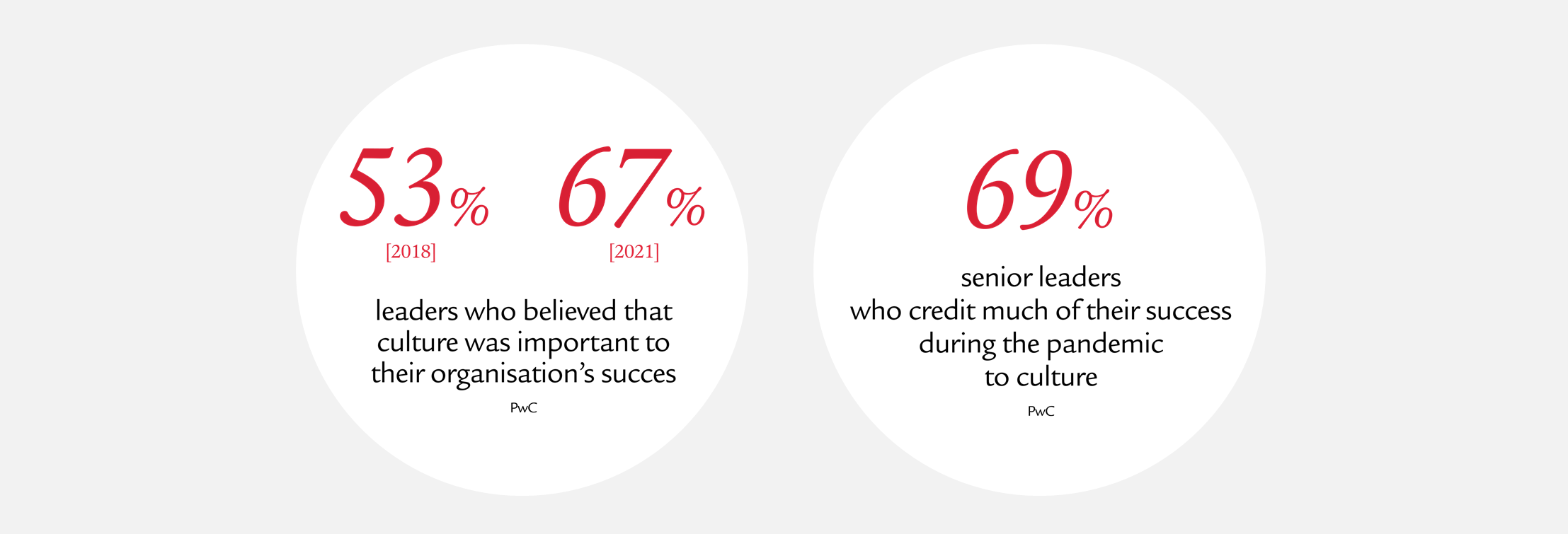Company culture is an important way of motivating employees, but to do so, it needs to mirror people’s own values and goals. After two years of great change, many businesses now have an outdated company culture that feels disjointed with current ways of working. As businesses adapt to their transformations, they should use the opportunity to instil a refreshed culture that empowers employees with the flexibility, choice and support they need to thrive.


Businesses around the world are trying to adjust to new ways of working. However, while they negotiate office and remote days with employees, many are missing the vital workplace ingredient that needs to adapt – and that is company culture.
Over the last two years, businesses have changed so much that their former culture is no longer effective at motivating and uniting employees. New people have joined the business, existing employees have new personal situations, and everyone has been exposed to new ideas about the best way to work. At the same time, businesses are going through great transformations, from shifting their purpose and customer base to integrating new technology.
Given that 70% of business transformations fail due to cultural-related roadblocks, we believe that businesses need to focus on their people to change successfully. Now, more than ever, freedom and flexibility will be essential in company culture. As businesses and the world around us continue to evolve at pace, company culture will need to do the same to align with employees’ changing values and priorities.
Benefits of an agile company culture
The pandemic highlighted the benefits of business adaptability in an ever-changing situation. Interestingly, almost 70% of organisations that were able to make positive transformations over the past year say that culture helped them succeed. Good company culture enables people to have open conversations, to collaborate and to make decisions quickly.
Yet many business leaders are failing to give culture the priority it deserves. According to James Heskett, UPS Foundation Professor Emeritus at the Harvard Business School, over 90% of leaders say they could improve their company culture but fewer than 20% say that they have taken steps to do so. These leaders are exposing their organisations to the risk that their employees feel undermotivated and frustrated, which will only drive them away.
Businesses cannot afford to ignore company culture and hope that it catches up with new priorities.

Keeping company culture authentic
A good business culture feels authentic because it is aligned with employees’ views, goals and values. At the moment, many businesses have a culture that feels outdated because it is no longer in touch with the realities people experience at work. We can illustrate this with views towards company purpose. Surveys show that 77% of senior management feel connected to the company’s purpose, but only 54% of other employees feel the same way. If there is a divide between how different team members view the organisation’s purpose, the culture is no longer effective at uniting them.
Employee feedback is crucial for leaders to tweak their culture so that it represents more people. Given the speed of workplace change, an annual survey is not enough to understand current needs. Business leaders need to have more regular feedback channels and hold follow-up meetings with individuals so that they can build an authentic and inclusive culture.
Authenticity is also key to making hybrid working a success. A recent EY survey found that 43% of people want choice over where their work. Rather than a home/office balance, they want the autonomy to choose the location that best suits them. Businesses that offer this freedom of choice will create a more authentic culture around hybrid working – a culture that values the benefits of flexibility.
Using communications to unite
Employees need to feel connected to the company culture if they are to champion it, yet internal communications are often overlooked by employers. As many as 74% of internal communications professionals say they spend most of their time reacting to requests to simply get information to colleagues quickly. When the focal point is simply to explain ‘what’ is happening, employees are wondering how any announcements and changes will impact them.
As businesses continue to transform for the post-Covid world, communications are an essential vehicle to strengthen company culture – especially with lots of new members of staff and different ways of working. This does not just cover internal communications, as collaboration should be nurtured too. It is estimated that meetings took up 21.5 hours of workers’ time per week in October 2021 due to the rise in video calls for remote workers. With more effective collaboration tools and processes, employees can choose when meetings are needed and how to use them most effectively, which will help company culture adapt to hybrid working.
Nurturing people to make change successful
One reason why many companies adapted successfully through the pandemic was that their employees knew how to respond to changes. Of the organisations with a distinct culture, 73% say that decision making became either easier or stayed the same during the pandemic. We believe that the culture in these organisations gave colleagues confidence in one another.
Creating this kind of culture involves being clear on people’s roles and giving individuals the autonomy and authority to make decisions, and to be supported in them. Training also plays a role. Employees need to be trained in using new tools and new hybrid processes in order to feel confident in the choices they make, day to day.
Reward strategies that better reflect the changed situation
Reward strategies are an important way to establish the company culture that businesses and their employees want. They should reflect the organisations’ values and employees’ needs, but many reward strategies are currently not reflective of modern working practices.
Surveys reveal that 48% of employees feel the pressure to be online when remote working, which is cultivating a culture of presenteeism. Now that company cultures are adapting to hybrid working, reward strategies need to focus more on achievements to motivate people in the new working environment.
Rewards also need to adapt to people’s own changing needs. Against the backdrop of the pandemic, 49% of people say they are feeling burned out.

Giving employees more choice through company culture
Establishing company culture – or tweaking it – is often approached with a rulebook attitude. At the moment, we are seeing lots of businesses trying to reassert their company culture by compelling employees to return to the office on set days. We believe that businesses following this strategy are setting themselves up to miss the mark.
Rather than looking back and trying to establish an outdated culture, businesses need to look ahead to align their culture closer with their employees’ new needs and values. By giving people a say in the company culture and empowering them to make choices on their own working style, businesses will create a stronger culture that promotes collaboration and independence. A culture in which people drive the business forward with new ideas.



